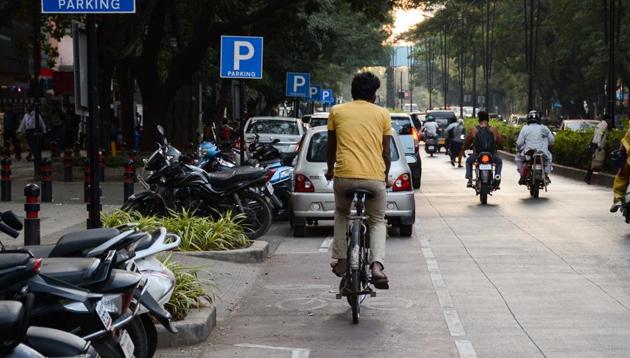#theyearthatwas: 2018 saw Pune bicycle plan lose momentum
The first-of-its-kind bicycle plan was then launched as part of the Smart City mission project first at Savitribai Phule Pune University, and later at Aundh where bicycle tracks were integrated into the Urban street design along with wide footpaths.
The Rs350 crore Pune bicycle plan which envisages a cycle network plan of approximately 470-km of segregated cycle tracks, painted cycle lanes and green ways was launched exactly one year ago.

The plan was set in motion by the then Pune municipal commissioner Kunal Kumar and a consortium of three companies- Prasanna Desai Architects, CEE (Centre for Environment Education) and ITrans was commissioned to prepare the bicycle plan for Pune.
The first-of-its-kind bicycle plan was then launched as part of the Smart City mission project first at Savitribai Phule Pune University, and later at Aundh where bicycle tracks were integrated into the Urban street design along with wide footpaths.
Two more cycle tracks are getting ready on JM road, Ganeshkhind road (Bremen chowk to University circle) and Satara road.
The plan has, however, lost momentum and is suffering from poor implementation.
The expensive red paint used to segregate the cycle tracks at Aundh has been completely worn out and the tracks are found encroached upon by four-wheelers rather than being used by cyclists. Recently, the civic body has diverted Rs50 crore meant for the bicycle plan, out of the Rs55 crore, to pay for water charges to the state irrigation department.
“As there was a need to repay money to the irrigation department, the standing committee diverted the amount of ₹50 crore from budgetary head of cycle infrastructure,” said Yogesh Mulik, standing committee chairman.
Srinivas Bonala, chief engineer (projects) said, the plan will not be implemented in parts of the city where it is overlapping with the 24x7 water works scheme. Hence, the PMC has decided to wait till the water supply department completes its work.
“This was a four year plan which has been delayed that is because of the water works department,” he said.
According to Sanskriti Menon, senior programme director, centre for environment education, who is closely associated with the project, the establishment of a bicycle department which has had meetings with the road department and traffic police to get the work underway; the roll-out of the public bicycle sharing scheme; the identification of 800 cycle parking spots in the city and the creation of three newly designed cycle tracks are among the successes of the scheme.
According to her, the cycle plan needs better implementation. Improvements needed include preventing encroachments, especially by motorcycles on cycle tracks and cycle parking, for which PMC and traffic police department must put in place regular fining, a cycle warden patrol and CCTV; fine tune the designs of the new cycle tracks, especially continuity at junctions and placement of bollards to prevent motorised twowheelers. The bicycle department also needs a full-time bicycle planner and support staff to work with the head of the department to ensure that infrastructure works and all the recommendations of the plan are taken up.
Prior to this plan, nearly 300 kilometres of cycle tracks had been laid out at a cost of ₹100 crore. However, the plan failed miserably as it was not user-friendly and the cycle tracks suffered from encroachments.
What is needed is an aggressive drive – from residents and civic authorities- to bring it back on track.






